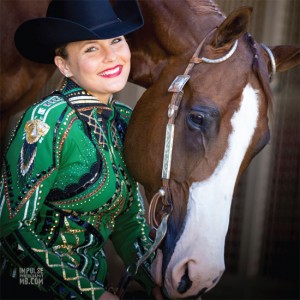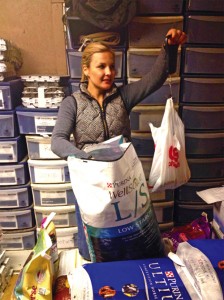A Day in the Life of an Equine Professional
By Lauren Levy
A Day in the Life of an Equine Professional: D&L Equine Specialist Angela Fox
 Angela Fox grew up showing horses. After high school, she decided she wanted to turn her passion into a career. She attended Colorado State University and earned a degree in Equine Science. After graduating, she began an internship with Mike and Simone Moser to learn more about the pleasure horse industry. Then, her former CSU professor and current AQHA judge, Tina Anderson, was able to get Fox an interview at a small feed store in Aubrey, Texas called D&L Farm and Home, where Fox still works today. Opened in 1988 by owners Dean and Lezlie MacElroy, D&L Farm and Home has grown to serve most of the top trainers and horse owners in Texas as well as all over the United States. For the past fourteen years, as the company has grown, Fox has been there to serve as the feed store’s official Equine Specialist.
Angela Fox grew up showing horses. After high school, she decided she wanted to turn her passion into a career. She attended Colorado State University and earned a degree in Equine Science. After graduating, she began an internship with Mike and Simone Moser to learn more about the pleasure horse industry. Then, her former CSU professor and current AQHA judge, Tina Anderson, was able to get Fox an interview at a small feed store in Aubrey, Texas called D&L Farm and Home, where Fox still works today. Opened in 1988 by owners Dean and Lezlie MacElroy, D&L Farm and Home has grown to serve most of the top trainers and horse owners in Texas as well as all over the United States. For the past fourteen years, as the company has grown, Fox has been there to serve as the feed store’s official Equine Specialist.
So what exactly does an Equine Specialist do? Fox explains that she is a jack-of-all-trades within the equine industry. “I primarily do outside sales for D&L, and I set up nutritional programs for all types of operations,” she said. However, Fox is also in charge of maintaining current business for the store, getting new business in the market, and ordering custom blankets and horse show equipment for clients all across the country. On any given day, she has to take care of tasks related to each of these duties. Still, because Fox’s job description is so diverse, no two days are alike. The day we shadowed Fox was no exception.
8:03 AM
Fox starts each day in her small office at the front of the Aubrey D&L feed store. “I always come in here first,” she said. “I return emails, place orders, follow up on loose ends, and I do a weekly log of who I have called on and who I have spoken with on the phone.” On this particular morning, Fox also had to ring up a number of customers, feed the bunnies who were for sale in the shop, answer a customer’s question about dog food brands, and print out paperwork before she could even sit down in her office. According to Fox, this is typical. “I always have a general outline for what I need to do in a given day, but something always comes up, so I don’t really ever stick to it.”
Once she was finally able to get settled back in her office, she had to call a customer who had asked her to research what dietary products their HYPP-positive halter horse should be eating. After doing this, she responded to emails from the day before and needed to call a new customer who wasn’t able to get bulk shavings from their usual provider. After speaking with the woman on the phone, Fox was ready to carry out the first of multiple farm calls she makes every day to clients’ ranches. She put her canine sidekick, Butchie, in her day bed at the back of the feed store, and we were off.
9:36 AM
Our first stop was to a customer’s ranch to do quality control on a sweet feed product they had purchased earlier in the week. As we drove, Fox explained, “I usually make four to seven farm calls a day. Sometimes, I spend 15 minutes at a ranch fixing a problem, and sometimes I spend three hours at a ranch looking at each horse and going through each horse’s diet.” This particular farm call was a short one. The customer had received a delivery of 30 bags of sweet feed. Although the feed smelled fresh and looked good, it didn’t have the usual amount of molasses sprayed on it, so her horses weren’t eating it as well. Fox explained that sometimes molasses bricks up in the winter when it gets cold. This makes the product difficult to scoop out of the bag, which customers dislike. To compensate for this, a number of feed companies will switch out their molasses for a blend of molasses and oil, which keeps the feed from bricking.
Fox suspected that this particular feed was going through the transition of utilizing different types of molasses and the manufacturer simply didn’t get enough spray on the feed. Still, it was Fox’s job to see how many unsatisfactory bags the customer had received and send the date codes to the manufacturer so they could handle the problem from there.
Next, as per her regular routine, Fox headed to drop off new product information to vets in the area. “Because vets are really busy, they aren’t usually out hunting new products. It’s my job to make sure they know what we have.” This way, vets can be sure to feed horses the very best products and better advise their clients as to what options are available for horses that might have particular dietary issues.
While at the vet, Fox received numerous texts and phone calls requesting orders of hay, shavings, and blankets. One order for 20 new slinkies and two sets of custom blankets came in from Highpoint Performance Horses, which is owned and run by AQHA Professional Horsemen Jason Martin and Charlie Cole. They requested that the order be filled quickly, in order to get their custom products in time for an upcoming competition. “Large orders, that need to be taken care of quickly, come in often during this time of year because it’s so cold in the area,” she said. “Often, trainers are getting ready for the start of the new show season, so they’re hoping to get their orders filled quickly.”
This makes Fox’s job a 24-7 affair. She shared, “People contact me at all hours, however late, however early, on Sundays, anytime to place orders or ask me questions.”
11:12 AM
 After visiting the veterinary clinics, Fox went to see a customer’s horse that needed a dietary evaluation. After arriving at the customer’s ranch, Fox chatted about the four-year-old Appaloosa halter mare that wasn’t carrying as much bulk as the owner would’ve liked. After examining the horse, discussing the mare’s eating habits with the owner, and learning that the horse was a picky eater, Fox made a dietary recommendation. She suggested that if they wanted to stay with their current grain, they could also use a fat supplement to add an additional 4,000 calories to the horse’s daily diet. Another suggestion made by Fox was to purchase a different feed for the mare and utilize a high fat, high fiber, extra palatable sweet feed that she might enjoy more. Fox explained that even if the mare didn’t eat more of this tastier feed, “there would still be more calories per pound in her diet, so the customer would at least get more bang for their buck.”
After visiting the veterinary clinics, Fox went to see a customer’s horse that needed a dietary evaluation. After arriving at the customer’s ranch, Fox chatted about the four-year-old Appaloosa halter mare that wasn’t carrying as much bulk as the owner would’ve liked. After examining the horse, discussing the mare’s eating habits with the owner, and learning that the horse was a picky eater, Fox made a dietary recommendation. She suggested that if they wanted to stay with their current grain, they could also use a fat supplement to add an additional 4,000 calories to the horse’s daily diet. Another suggestion made by Fox was to purchase a different feed for the mare and utilize a high fat, high fiber, extra palatable sweet feed that she might enjoy more. Fox explained that even if the mare didn’t eat more of this tastier feed, “there would still be more calories per pound in her diet, so the customer would at least get more bang for their buck.”
While at this customer’s ranch, Fox also sampled the hay. “Hay sampling is a great tool to test for levels of potassium, protein, and the digestibility of bulk orders of hay.” Fox used a tool called a core sampler to collect a small sample of hay from a couple of bales out of the bulk order. She did this to get an accurate average sample of the product. “After I collect the sample, I will send it off to a lab, and we will get the results back within a week. Some customers like to do this before they purchase large quantities of hay from us, so they know exactly what they’re getting.” Hay sampling results can also tell a customer what type of hay or combinations of hay would best fit their horse’s dietary needs.
12:00 PM – 1:00 PM
After sampling the hay, it was time to take a break for lunch, which, for Fox, is just another opportunity to continue working. Three times a week she tries to take customers to lunch, and today was one of those occasions. “I think it’s why I have such a good relationship with so many of them,” she said. “I’ve become friends with a lot of them. We show together, and they call me if they have a problem. They know they can trust me, and I won’t tell anyone their business. Lunch is also a good time for them to ask me any nutrition questions they may have.”
Our stop today was Mom’s on Main Street, a popular lunch spot for some of the top trainers in the Pilot Point area. Sure enough, Fox’s customers/friends had plenty of questions about what she had recently recommended for the Appaloosa mare she’d just taken a look at. As we were leaving lunch, Fox had to take a phone call from a customer in Colorado who wanted to order custom blankets for her horse and have them ready before a competition just a few weeks later. While she was on the phone with that customer, Fox received three more text messages from other people placing feed orders.
1:15 PM
After lunch, we went to visit the resident trainer at Blue Ribbon Ranch, which is owned by Vern and Rita Habighorst. The Habighorst family, also the owners of Blue Ribbon Custom Tack, had just purchased the property and quickly became D&L customers. It was Fox’s job to check in on their resident trainer, Joe Engle, to make sure he was receiving satisfactory service from the store. While we were there, Engle asked Fox if he needed to worry about blister beetles in his hay since this is the first time he has lived in and purchased hay in Texas.
Fox took this opportunity to explain how important it is to remain aware of blister beetles. “It’s a good question for anyone new to our area to ask where the hay they are purchasing comes from and ask more information about blister beetles. Although they are uncommon, one ingested beetle can kill a horse.” These beetles are often found in alfalfa hay, most commonly in arid, western states where grasshoppers are numerous, but they can also be found elsewhere. These beetles are found near large populations of grasshoppers because they feed off grasshopper larvae. Fox advises that if you find any unidentifiable beetle in your hay, you should stop feeding the bale to your horses immediately and speak with someone who is qualified to identify the beetle, like a local veterinarian.
2:35 PM
After visiting with Engle, Fox drove back to central Aubrey to meet with another customer who also had problems with a recent order of sweet feed. This customer’s sweet feed contained corn that was not fully “crimped,” or chopped, and their horses were sorting out the larger pieces of corn. Once again, it was Fox’s job to find out how many defective bags there were and report the problem to the manufacturer. While we were there, Fox explained just how important it is that horses receive the correct amount of daily nutrients and why it’s essential to address such issues with feed. “The amount of food a horse should consume depends on the horse and where it is in its stage of life,” she said. “A general rule is a horse should consume 2 to 2.5% of their body weight in grain and hay a day. It’s vital that horses receive the correct nutritional and caloric values every day in order to remain healthy.” If feed is defective and the horses aren’t eating what they should be, it can cause a real problem.
One way Fox tries to educate her customers and ensure that their horses are receiving the correct amount of feed each day is by measuring their feed scoop, which can come in a number of different sizes. Fox will take a customer’s scoop, fill it, and place the feed into a bag. She will then measure the feed with a digital scale so she can accurately see how many pounds of feed one of their scoops equals. “Sometimes, they need a smaller scoop,” she said. “Sometimes, we find out where the two pound [mark] is, and we cut the scoop so there’s less error.” This not only saves the client money, if they have unknowingly been overfeeding their horse, but it also ensures that the horse is getting the right amount of feed for optimal health.
3:15 PM
After visiting her last customer, Fox’s day was coming to an end, but we still had one last stop to make. Fox needed to stop at a local Arabian trainer’s ranch to drop off a jacket that Purina had sent as a thank you gift. Earlier in the year, the husband and wife team had allowed Purina to tape them for a promotional video. Purina had needed stock footage for the re-launch of their 1,200 acre research farm in Gray Summit, Missouri.After visiting with her D&L customers and learning about some of the differences between Arabian horse disciplines and Quarter Horse disciplines, Fox has now become highly accomplished in the Quarter Horse show pen having won a World Championship in Horsemanship, three Reserve All-Around Congress Championships, and multiple Congress Championships with her horse, The Heat Seeker.
After visiting her final customer for the day, Fox returned to the feed store to collect Butchie, who was extremely excited to see her, say goodbye to her boss and fellow employees, and go home for the night.
Still, even when Fox is done working at D&L, her day as an Equine Specialist is not done. “I work until four on most days, except for on Wednesdays when I close the store at 7:30. This is a perk I negotiated years ago because I ride my horse every day after I work. A lot of times, horse trainers are ending their days by five or six. This way, I can go ride before it gets dark.” Every day, after Fox rides, she goes home, makes dinner for her husband, Adam, and cares for two horses she keeps at her own house. On a typical day, her work with horses is not done until 10:30 PM. Then, the next morning, at 6 AM sharp, Fox has to be up again, providing the horses with their morning feed before she heads off to work.
Despite the long hours and hard work, Fox loves her job. If all goes as planned, she hopes to work at D&L as their Equine Specialist for many years to come. It seems likely that horse lovers in the Aubrey area would hope this is the case as well, because they’re going to continue to need nutritional guidance for their horses, someone to order that last-minute custom horse show blanket, and a qualified and knowledgeable friend to turn to when their horse is in need.
Click here to read the complete article!










